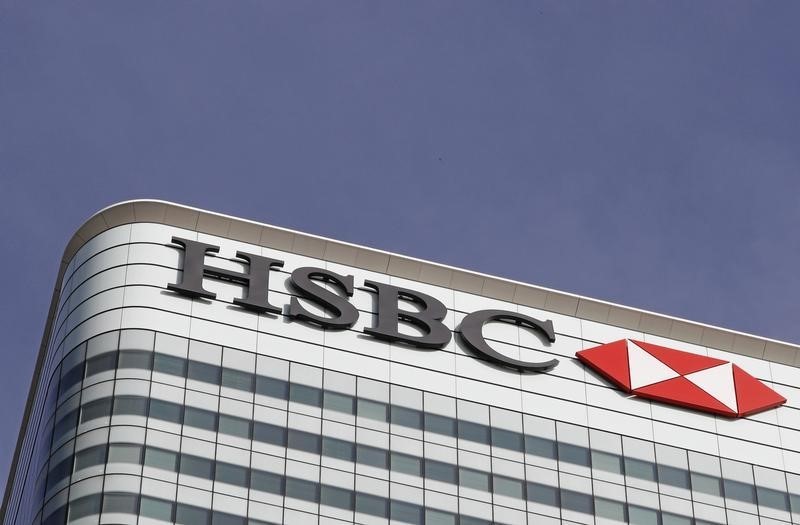By Sinead Cruise
LONDON (Reuters) - Pay is not the only thing HSBC (L:HSBA) investors will challenge executives over at Friday's annual meeting in London, calls for reassurance on dividends, Chinese expansion and succession planning are all set to feature.
Concerns about moving to Asia, which dominated last year's event, have been replaced by a litany of fresh worries, topped by fears about whether an 8 percent dividend yield can be sustained as the global economy stalls.
"Owners of the stock need to be aware that there is a very high probability that HSBC is going to have to cut its dividend in the next 12 to 18 months," said Ian Tabberer, a fund manager at Henderson Global Investors, which holds HSBC shares.
"They (HSBC) appear to jump head first into markets where supply of capital is increasing, the price they can fetch comes down and they end up hurting themselves," he said, referring to a push into mainland China, under HSBC's "Asia Pivot" strategy.
Chief Executive Stuart Gulliver and Chairman Douglas Flint are both big believers in the potential of China's Pearl River Delta - home to 11 industrial cities set to fuse into one megopolis - but the big pay-off may not come until long after they have left the bank, analysts warn.
Other investors question whether this capital-intensive expansion should be halted until HSBC completes its exit from Brazil, quells worries about its main capital ratio and cuts its compliance bill, which is set to peak in 2016.
Such concerns mean shareholders, reeling from a 25 percent fall in HSBC's share price over the last year, have given a proposal to buy back shares a lukewarm reception, citing a weak revenue outlook and fears that HSBC's management has run out of ideas to support short-term growth.
"I don't think HSBC have a lot of capital to play with," said one of the bank's 40 largest investors, who declined to be named in line with his company's policy.
"The market is implying that HSBC's dividend is gone or halved. A buyback perversely does help to sustain the dividend as it reduces the share count...The earnings per share trajectory is much more important," the investor said.
At Monday's Hong Kong shareholder meeting, Gulliver said the management team shared investor frustrations about the share price and said HSBC remains "committed to a progressive dividend", subject to its long-term profitability.
PAY ATTENTION
Investor advisory firm Pensions & Investment Research Consultants (PIRC) has urged shareholders to reject HSBC's pay plans and oppose Flint's re-election, days after it was named in a data leak from a Panamanian law firm which set up thousands of offshore structures to help rich clients hide their wealth.
HSBC said the documents pre-dated a reform of its business model, but the saga is a set-back to attempts to overhaul the bank's image, after a series of scandals and a year after revelations its Swiss business helped clients dodge tax.
Investors are also keen for an update on HSBC's search for a chairman, following speculation that ex-AXA (PA:AXAF) boss Henri de Castries was being readied for the position. The search for a new CEO is expected to follow shortly after.
HSBC has already said it was looking for a replacement for Flint, 60, and aims to nominate his successor in 2017. Last year, 96 percent of investors backed his re-election.
And dissent on pay continues. PIRC has also criticised Gulliver's bonus, which exceeded 200 percent of his salary and benefits package, which is worth 50 percent of his base pay.
Some of HSBC's future benefit plans for its executives have been reined in, but PIRC said the maximum potential awards are still "highly excessive", and should be opposed.
Last year, there was a significant backlash, with almost 1 in 4 investors who voted opposing HSBC's remuneration report for 2014.
"We have had an active and constructive dialogue with all our major shareholders with respect to our remuneration policy," a spokeswoman for HSBC said in a statement.
"We haven't voted in support of any banks on pay since 2012, and we have taken that decision because of performance, conduct issues, fines and returns – all of those things put together mean it is difficult to see how boards have been able to justify the amounts paid to executives," Shade Duffy, Head of Corporate Governance at AXA Investment Managers, one of HSBC's 15 largest shareholders, told Reuters.

HSBC agreed in 2012 to pay $1.92 billion (1.3 billion pounds) in U.S. fines, mainly for allowing itself to be used to launder drug money flowing out of Mexico.